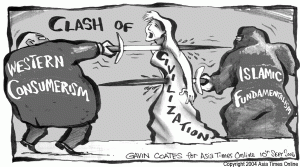
A Guide for the Perplexed is the title of a book written by the late twelfth-century Jewish physician, rabbi and philosopher Moshe Ben Maimon (known, to non-Jews, as Maimonides). Born and raised under Moslem rule in Spain, late in life he moved to Morocco and Jerusalem before settling in Cairo where he took a prominent part in communal life before dying in 1204. The book, written in Arabic but making use of Hebrew letters, deals with some of the most fundamental issues surrounding Judaism and religion in general. Such as God’s existence, His attributes, His relationship with the world, the ways in which He may be known, the question of necessity versus freedom, and so on. At a time when Israeli politics are hitting the headlines, I shall use its title to explain the smorgasbord of squabbling parties currently represented in Israel’s 120-member, unicameral, parliament (the Knesset).
Likud (Cohesion). Various parent-parties of Likud go back to the mid-1930s when it was set up as a right-wing, bourgeois counterweight to the dominant Labor Party. Beginning in 1977 it has won most elections and had two of its leaders (Menahem Begin, Yitzhak Shamir) serve as prime ministers. Starting in 1993 it has been led Benjamin Netanyahu on a hawkish platform whose main tenets are a free (well, more or less) enterprise economy and the determination to retain the occupied territories at almost any cost. Ordinarily one would expect such a party to attract the comfortably off; in fact however, most of its support comes from “the poor and the praying” as Begin once put it. Currently it has 32 seats in the Knesset.
Yesh Atid (There is a Future). Founded by brilliant journalist and author, Yair Lapid as recently as 2012, Yesh Atid has been running on a more secular platform than that of Likud. Indeed Lapid’s time as prime minister, which lasted from mid 2022 to late in the same year, was in some ways the best in the country’s entire history. Like all parties to the left of Likud, Yesh Atid has proclaimed its strong desire for some kind of peace with the Palestinians in particular. Also like all parties to the left of Likud, neither it nor its leaders have the slightest idea how this could be achieved. Currently it has 24 seats and is the largest opposition party.
Tikvah Hadasha (New Hope). Founded by a former minister of defense, General (ret) Benjamin Gantz, currently this party commands 12 Knesset seats and forms part of the opposition. Yet personalities apart, just how it differs from Yesh Atid and why has not joined the latter no one knows.
Shas (short for, Guardians of the Six books of the Talmud). An orthodox-religious party that appeals mainly to the Sephardi poor and less well educated. Founded around 1980, since then it has acted as Likud’s more or less faithful partner in setting up various governments. Forming part of Netanyahu’s coalition, at the moment it has 11 Knesset members. Known mainly for its loathing of everything Ashkenazi as well as the corruption which has caused several of its leaders to spend time in prison.
Religious Zionism. Until 1977 this party regularly teamed up with the dominant left, forming various successive governments and keeping itself busy with such things as kosher food (a great source of income for rabbis, incidentally) and public transportation on the Shabbat. Since then, however, it has turned sharply to the right, gaining support among the West Bank settlers in particular on a platform which in many ways reminds one of Mussolini’s Fascism. Currently it occupies 7 Knesset seats and is a member of Netanyahu’s coalition
United Torah Judaism. Sharply divided between Ashkenazis and Sephardis, this party represents the ultra- orthodox. With currently 7 Knesset seats, it is doing what it can to join Shas in turning Israel into a sort of Jewish Iran. Complete with every kind of restriction on non-kosher food, gay and lesbian and trans life, abortion, public transportation on the Shabbat, and even the right of men and women to enjoy the same beaches, the same swimming pools, and the same pavements.
Otzma Yehudit (Jewish Power) currently commands 6 Knesset seats. Led by a former rowdy, it has long specialized in mounting pogroms against Arabs, both Palestinian and Israeli ones. If any group has the potential to turn Israel into a Nazi-like state and society, complete with “resident aliens” (Arabs who agree to being relegated to second-rate status without political rights) and expulsion (of Arab who do not) it is this one.
Israel Beiteinu (Israel, Our Home). A leftover from the 1990s, when there were several parties claiming to represent freshly arrived immigrants from the former USSR, originally this party took a strong right-wing anti-Arab, stance. Commanding 7-8 Knesset seats, at one point it was sufficiently powerful for its leader, Avigdor Lieberman to, claim and obtain a post as minister of defense under Netanyahu (2016-18). Starting in 2022, though, its influence began to decline. Left in command of just 6 seats, it has drifted into the opposition, focusing mainly on preventing the state from being taken over by the Orthodox parties.
Two Israeli Arab parties, one Islamic/conservative, one (relatively) modern and liberal, commanding 10 seats between them and forming part of the opposition.
Labor Party. Representing the sad remnants of a party that used to rule Israel for decades. With 4 seats at its command Labor, like most of the rest, professes its strong desire for peace with the Palestinians without however, having the slightest idea of how to achieve it or even whether it can be achieved at all. Since this is completely unrealistic, it peddles an Israel version of Wokeness. As a result its appeal is limited, especially among the orthodox and the “traditional” (moderately religious) who, together, form about 60 percent of the overall population.
Noam (Niceness) a one-MK version of National Zionism without the latter’s violent edge.
*
As in other countries, all these parties claim to be motivated solely by the public good.
As in other countries, all these parties claim to be peace-loving.
As in other countries, they need a powerful judiciary to keep their ambitions in check.
As in other countries, a plague on all their houses.
As in other countries, a democratic regime cannot do without them.






